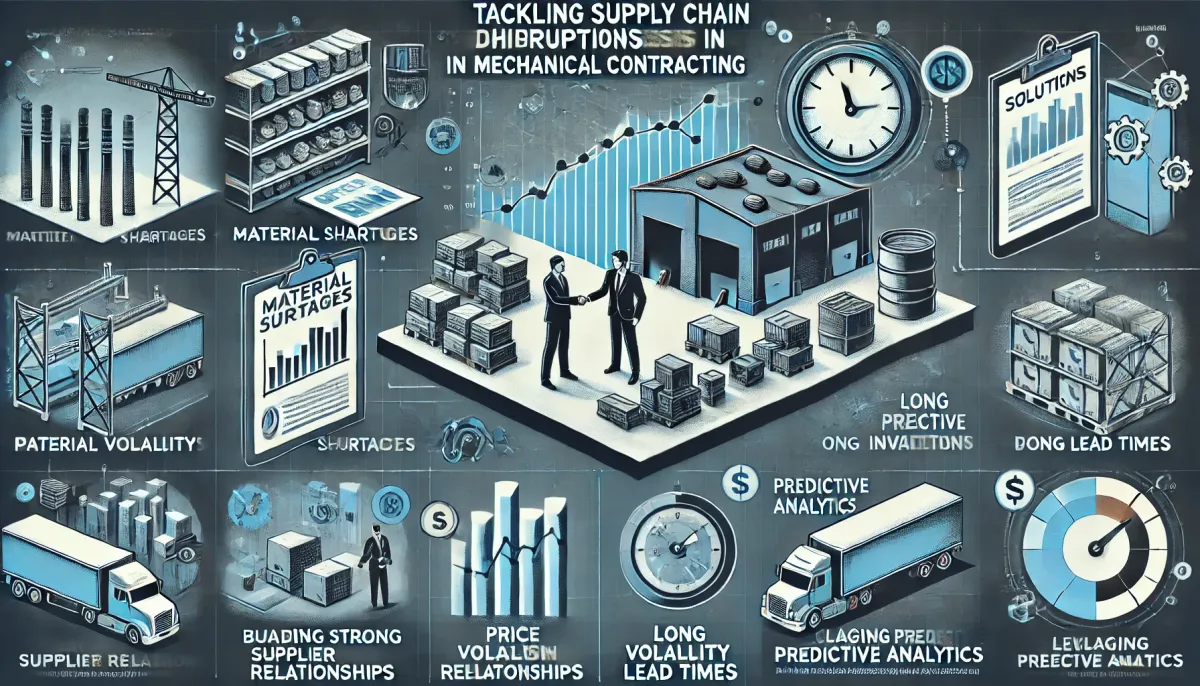
By Jenny Holly Hansen | WBN News | April 17, 2025
In an interconnected world, mechanical contractors depend on efficient and reliable supply chains to deliver complex projects on time and within budget. However, global supply chain disruptions have become a persistent issue, leading to material shortages, price volatility, and significant project planning challenges. For mechanical contractors, addressing these disruptions is essential to maintaining profitability and meeting client expectations.
The Supply Chain Crisis
The COVID-19 pandemic, geopolitical tensions, and increasing demand for raw materials have collectively disrupted global supply chains. For mechanical contractors, these challenges translate into delayed shipments of critical components such as pipes, valves, HVAC units, and refrigerants. Even when materials are available, volatile pricing makes it difficult to estimate project costs accurately.
These disruptions don’t just affect timelines—they ripple through the entire project lifecycle. Contractors are often forced to pause projects or adjust schedules, which can strain client relationships and impact overall revenue.
Impact on Mechanical Contracting Projects
- Material Shortages
Critical materials like copper, steel, and refrigerants are often in short supply, delaying construction schedules and causing operational bottlenecks. Contractors must frequently switch suppliers or substitute materials, which can compromise quality and consistency. - Price Volatility
Fluctuating material prices wreak havoc on project budgets, forcing contractors to either absorb additional costs or renegotiate contracts with clients. - Long Lead Times
Equipment with long manufacturing and shipping timelines can delay project completion, putting contractors at risk of penalties and missed opportunities for future work.
Strategic Approaches to Mitigate Disruptions
To address these challenges, mechanical contractors must adopt proactive strategies that enhance supply chain resilience. Here are key approaches to consider:
- Building Strong Supplier Relationships
Establishing long-term relationships with reliable suppliers is critical. Contractors who collaborate closely with suppliers gain better access to materials during shortages and may negotiate more favorable terms. Reliable suppliers can also provide insights into market trends and potential disruptions. - Maintaining a Robust Inventory
Stocking critical components can help contractors navigate short-term shortages. While maintaining inventory comes with costs, it serves as a buffer against unexpected supply chain disruptions. - Leveraging Predictive Analytics
Predictive analytics tools can forecast material needs based on project schedules, market conditions, and historical data. Contractors can use these insights to plan purchases more effectively, reducing the risk of delays and cost overruns. - Diversifying Suppliers
Relying on a single supplier for critical materials can be risky. By diversifying suppliers across regions, contractors can mitigate the impact of localized disruptions. - Exploring Alternative Materials
In some cases, substituting materials or components can help keep projects moving. For example, contractors might opt for newer, readily available materials that meet project specifications. - Collaborating with Stakeholders
Open communication with clients and stakeholders ensures everyone is aware of potential delays and cost adjustments. Transparency builds trust and helps manage expectations effectively.
Technology as a Solution
Advancements in technology provide a lifeline for mechanical contractors dealing with supply chain issues. Tools like supply chain management software and Building Information Modeling (BIM) can streamline procurement processes and improve coordination between contractors and suppliers. Additionally, automation can help optimize inventory management, reducing waste and minimizing costs.
Looking Ahead
While global supply chain disruptions are likely to persist, mechanical contractors have an opportunity to turn these challenges into a competitive advantage. By investing in supplier relationships, leveraging technology, and adopting strategic procurement practices, contractors can strengthen their resilience and ensure project success.
The path forward requires adaptability and proactive planning. However, with the right strategies in place, mechanical contractors can navigate supply chain challenges effectively, positioning themselves for long-term growth and sustainability in an evolving industry landscape.
Let’s Keep Talking:
Jenny is a business insurance broker with Waypoint Insurance.
She is also a business development consultant with Impresario Partners, helping Canadian Business expand overseas.
She can be reached at 604-317-6755 or jholly-hansen@wbnn.news. Connect with Jenny on LinkedIn at https://www.linkedin.com/in/jenny-holly-hansen-365b691b/. Connect with Jenny at BlueSky: https://bsky.app/profile/jennyhollyhansen.bsky.social
Let’s Meet Up:
Jenny Holly Hansen is a cohost with Chris Sturges of the Langley Impact Networking Group. You are welcome to join us on Thursday’s from 4pm to 6pm at: Sidebar Bar and Grill: 100b - 20018 83A Avenue, Langley, BC V2Y 3R4
TAGS: #Jenny Holly Hansen #Mechanical Contractors #Supply Chain Disruptions #COVID-19 Pandemic #Geopolitical Tensions


